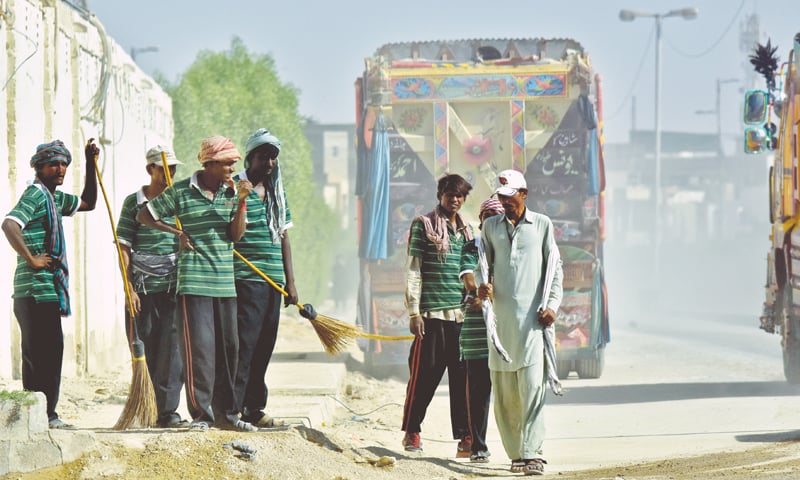“If a man is called to be a street sweeper, he should sweep streets even as Michelangelo painted, or Beethoven composed music or Shakespeare wrote poetry. He should sweep streets so well that all the hosts of heaven and earth will pause to say, ‘Here lived a great street sweeper who did his job well’.
No work is insignificant. All labour that uplifts humanity has dignity and importance and should be undertaken with painstaking excellence.”
– Dr Martin Luther King Jr.
KARACHI: There he is amid a tornado of dust of his own making. His hair has turned light brown as dust settled on his head, his clothes are dirty as are his hands and feet.
When asked why can’t he, being in the line of cleaning, be clean himself, he blinks before looking down at his dirty hands and feet. “Baji, that can’t be,” he says. “Either I clean your roads, or I clean myself. If I clean myself, I would not want to touch anything dirty or dusty and you will find a clean sweeper here but very dirty roads,” he reasons as he gets back to his work.
The storm of dust from his jharoo, or besom, makes you cover your nose and mouth as you turn away. Meanwhile, there he is gathering trash on one side of the footpath without any protection or dust mask.

There are more sweepers seen cleaning the streets and roads in the morning than in the afternoon. But their duty hours are from 6am to 4pm. “It gets very hot in the afternoon so we may not be so active later, having done most of our work earlier. During the afternoon many of us responsible for cleaning an area would meet up in a corner with a little shade, on the footpath or under a tree for a breather where we can relax and maybe talk or discuss one another’s problems while searching for their solutions or simply just to eat lunch or have tea,” says Nazeer Ahmed, resting under a bougainvillea shade with his young colleagues Adnan and Naveed.
The boys seem very young, somewhere in their early to middle teens. “They are both about 15 years of age,” says Nazeer.

But is that not too young to be working? “Not at all,” says Adnan, one of the boys, while enjoying his potato crisps. “We are inducted into the workforce at 14 or 15 years of age. We are all contractual employees, providing cheap labour,” he adds.
And how much salary is he paid? “Rs10,000 a month,” he announces with pride. But when asked further if this was just the starting salary and he would be paid more when he climbs up in rank, the boy shakes his head. “No, I am told that this is it! What we are getting now, we can expect to get even after several years. We hardly get any raise,” he says.
“Still, we are free to work privately after getting off duty. Then we can make a few more rupees. Sometimes, we are paid Rs100 or 200 by a shop or house owner to clean their entrance or gate slope.”

Asked if the chips he was eating was his lunch, he smiles and shakes his head again. “My mother has packed me lunch. We will gather somewhere later and open all our lunches to make a feast of it,” the boy says.
And do they carry enough water to quench their thirst in the hot weather? “We have old disposable bottles which become empty too soon. Then we go about knocking at doors, requesting any of the houses here for water. Sometimes they give us a hose to refill our bottles, sometimes they tell us to get lost. If they bring us water from the fridge, they insist on pouring it themselves as they don’t want us to touch their bottles,” he says.

Meanwhile, there is Qaiser sweeping away off Tariq Road with two besoms making more of a mess than what he had started with. “Two are always better than one, Baji,” he says on being asked what did he think he was doing. “I’m lifting the dirt and trash with one jharoo and collecting it on one side with the other.”
It is believed by many of the older sweepers here that the British masters of imperial India had specially invented the besom to make the menial workers bend a little when going about their work as if they were in a constant state of bowing. “For themselves they had the broom. But for us they had the jharoo,” says Basheer, an elderly sweeper. “And we got used to the jharoo for cleaning, so much that we don’t think that we can make much use of a broom now,” he says, while showing how easily the twigs of his besom can reach difficult areas and tight spots.
“But we found a way around the problem long ago,” says the young Adnan, “by adding a stick to the jharoo. Now we don’t have to bend or bow for anybody while we work.”
Published in Dawn, April 22nd, 2018














































Dear visitor, the comments section is undergoing an overhaul and will return soon.